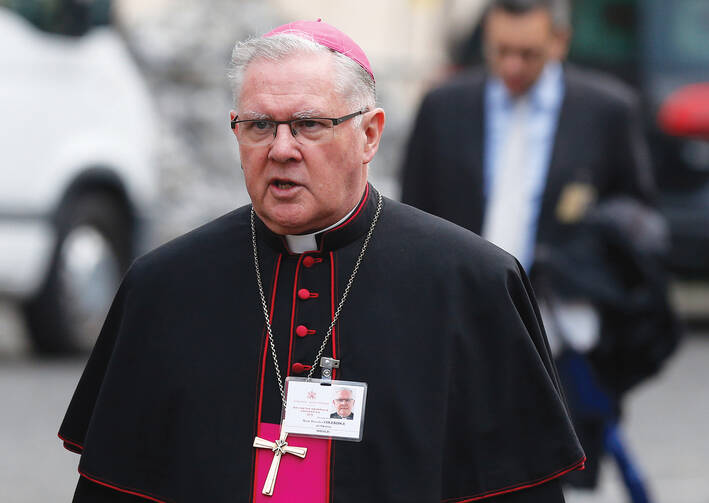As the head of the Archdiocese of Brisbane on the east coast of Australia, the archbishop was a delegate to the meeting of the Synod of Bishops in Rome in 2015. There, he said, he witnessed healthy disagreement about issues important to families during the two-week meeting—prompted by Pope Francis’ call for open and honest dialogue. That debate has continued more than a year after the synod came to a close, with some bishops calling for greater clarity from the pope. But Archbishop Coleridge told America that uncertainty is simply part of modern life.
“At times at the synod I heard voices that sounded very clear and certain but only because they never grappled with the real question or never dealt with the real facts,” he said. “So there’s a false clarity that comes because you don’t address reality, and there’s a false certainty that can come for the same reason.”
The archbishop, who worked in the office of the Vatican secretary of state in the late 1990s, was responding to a question about critics of Pope Francis who have taken issue with his apostolic letter “Amoris Laetitia,” in which the pope calls for a pathway to Communion for divorced and remarried Catholics. Critics of the pope have stepped up their attacks on the document in recent months, emboldened by a letter sent to the pope by four cardinals in September asking for yes or no answers to five questions about the document. They say the pope is sowing confusion in the church on questions settled by previous popes.
But the pope’s supporters, including Archbishop Coleridge, say Francis is simply asking the church to confront challenging questions.
“I think what Pope Francis wants is a church that moves toward clarity and certainty on certain issues after we’ve grappled with the issues, not before,” he said. “In other words, he wants a genuine clarity and a genuine certainty rather than the artificial clarity or certainty that comes when you never grapple with the issues.”
Archbishop Coleridge said he agrees with a fellow Australian, Cardinal George Pell, who said in London recently that some Catholics are “unnerved” by the debate about “Amoris Laetitia.”
“I think that’s probably the right word, and I sensed in the words of the four cardinals men who were unnerved,” Archbishop Coleridge said.
But where Cardinal Pell went on to suggest the pope needed to offer clarity on the issue, Archbishop Coleridge said Francis is simply acting like a pastor. The pope, he said, is “bringing out into the very public setting of the papacy what any pastor does in his parish or diocese.”
He noted that pastors are “very often dealing in a world of grays and you have to accompany people, listen to them before you speak to them, give them time and give them space, and then speak your word perhaps.”
Ultimately, individual believers have to discern where God is at work in their own lives—a process that does not always lend itself to simple yes or no answers. He said Francis is moving the church from a static way of doing business to one that is kinetic, something those used to a different kind of papacy are finding difficult.
“But there are still people who are more comfortable, for various reasons, with a more static way of thinking and speaking,” he said. “And there are people who are perhaps more comfortable in a world of black and white and who find the process of discernment—which deals in shades of gray—messy and unnerving.”







